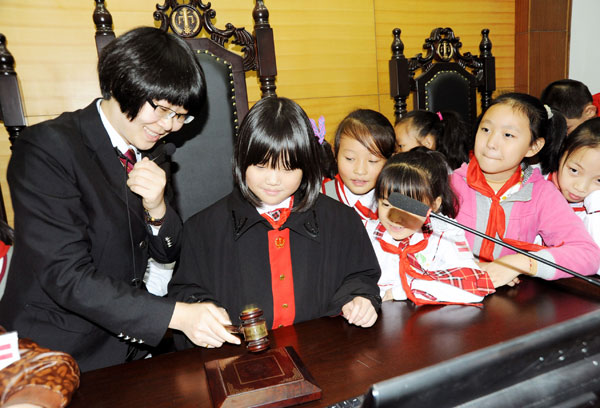Evidence gained by torture banned
Updated: 2013-11-22 01:45
By Cao Yin (China Daily)
|
|||||||||||
New guidelines seek to define limits on interrogation of suspects in detention
|
 |
|
Primary students in Yunyang county, Chongqing, attend a mock court session during an open day at the county court. Rao Guojun / For China Daily |
Evidence obtained through torture and other improper interrogation methods will not be allowed in trials, according to senior judges of China's top court.
The Supreme People's Court issued a guideline on Thursday detailing how to prevent unjust, fake and wrongful decisions. The guideline requires courts to not accept evidence gained through the torture, described as freezing, starving, burning or fatiguing suspects.
Judges must rely on evidence to identify facts, and "ensuring that the evidence is legally obtained can avoid unjust, fake and wrongful decisions to a large extent," said Lyu Guanglun, deputy chief judge of the court's criminal department.
"We are trying to be clear in defining torture," he said.
The guideline, drafted since the beginning of this year, is one facet of the judicial reform alluded to at the recently concluded Third Plenary Session of the 18th Communist Party of China Central Committee, he added.
Cheng Lei, an associate law professor at Renmin University of China, praised the guideline, saying the clarification of torture will be easy for law enforcement authorities to interpret.
Barring evidence gained by fatiguing suspects is laudable because in some cases, investigators prolong interrogations to wear suspects down, he said.
"But now it is written into the guideline, which, I think, is great progress and will help reduce erroneous court rulings," he added.
However, Zhao Li, a Beijing lawyer who specializes in criminal cases, said he hopes to see a more detailed definition of interrogation by fatigue.
He gave one of his client's experiences as an example, saying the defendant was interrogated for more than 12 hours. "The man told me he was crazy at that time, because his rest time, such as sleep or eating, could not be ensured," he said.
Zhao said the defendant signed the interrogation record because he was too tired to resist. "It is important to make clear how much time must pass between interrogations and how fatigue is defined," he added.
Some courts in Beijing and Shanghai and Jiangsu province have already noticed the problem, Cheng said.
Cheng and Zhao said that the court's guideline will also help push reforms in prosecution and police organizations.
Wang Qi, a police officer in the Haidian district of Beijing, said the guideline will make his work more difficult and could reduce the number of cases that are solved. "That is to say, the guideline puts forward higher requirements on our work," he said.
In addition to barring illegal evidence, the guideline also requires courts to come to their rulings independently so that verdicts are not made under pressure from local governments and public opinion.
Related Stories
Court rules out confession through torture 2013-11-21 13:59
Number of torture cases falls 2013-06-27 21:46
China launches remote-sensing satellite 2013-11-20 09:26
Man appeals, gets 2nd trial in toddler's death 2013-11-19 14:53
Today's Top News
Li: China-Europe 2020 plan 'unprecedented'
Blueprint tightens China-EU links
Obama sets new date for Asia visit
Manufacturing PMI may decrease
'Tapering' of QE by US would benefit world
China's stealth drone flies for test
Evidence gained by torture banned
Europe can be a mirror of future China
Hot Topics
Lunar probe , China growth forecasts, Emission rules get tougher, China seen through 'colored lens', International board,
Editor's Picks

|

|

|

|

|

|





